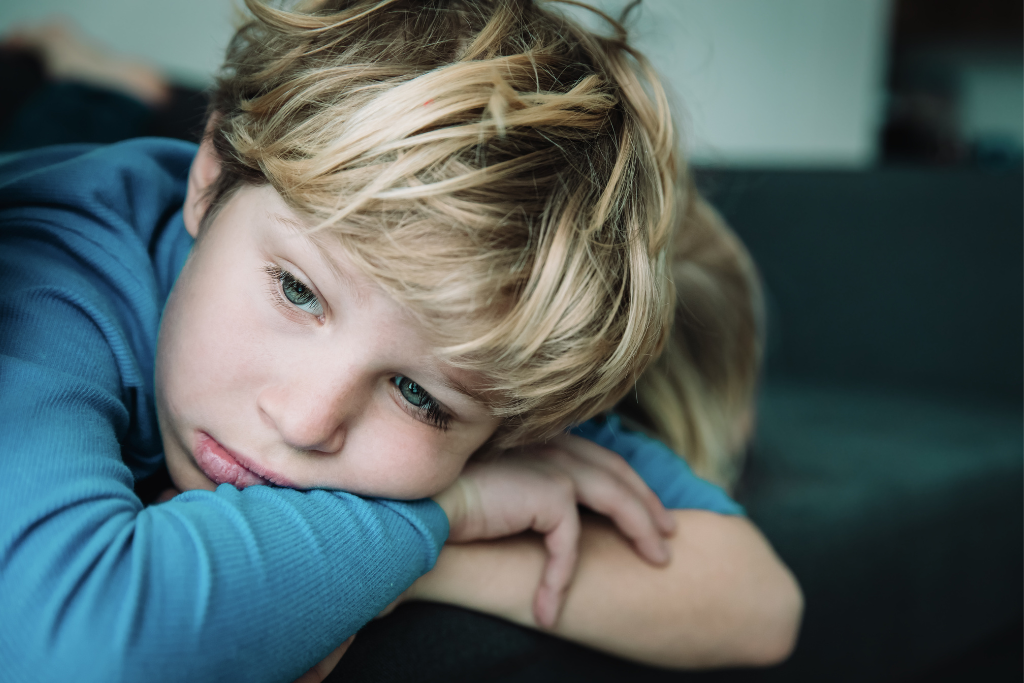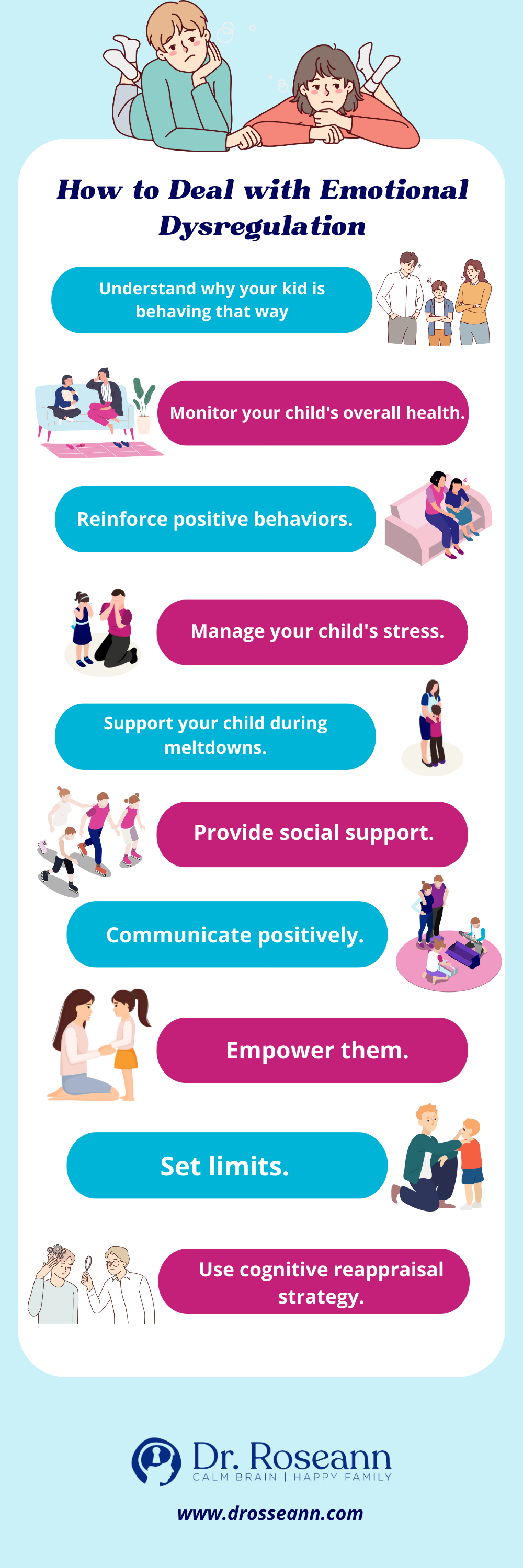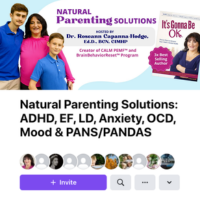All kids experience emotional upset but some children are more prone to episodes of emotional or behavioral dysregulation. When children or teens are more sensitive that often equates to more stress for parent and child.
Emotional dysregulation describes emotional responses that are poorly regulated and do not fall within traditional criteria for emotional reactions. Mood swings, marked mood fluctuations, and labile mood are other names for it.
The symptoms of emotional dysregulation disorder include anger, rage, irritability, moodiness, anxiety, poor impulse control, withdrawn behaviors, and other behaviors. Children and teens who are emotionally reactive are more prone to have clinical issues such as depression, OCD, anxiety disorders, suicidal thoughts, self-harm, substance abuse, and other self-destructive behaviors.
With increased emotional reactivity, your child may find it harder to function at home, work, or school. Sibling, friend, and parent relationships may suffer as a result of a child's over reactivity.
Micah was thirteen-year-old who was always easily upset and it only ramped up in adolescence. It seemed that every year in middle school, she lost friends and by the eighth grade, her parents were very worried about high school and beyond. Talk therapy did little for Micah because she was just too easily irritated and impulsive to use the strategies. In our program, Micah first regulated her nervous system with PEMF, diet changes to balance her blood sugar, and neurofeedback and then she and her parents learned strategies to cope with uncomfortable sensations, thoughts and emotions. Mikah had a remarkable change and she worked hard to renew friendships and relationships. When your brain is regulated, regulating your responses becomes so much easier and Mikah and her parents were all in with learning new ways to cope.
Here are a few effective ways to deal with emotion dysregulation in children and teens.
#1 Understand why your kid is behaving that way.
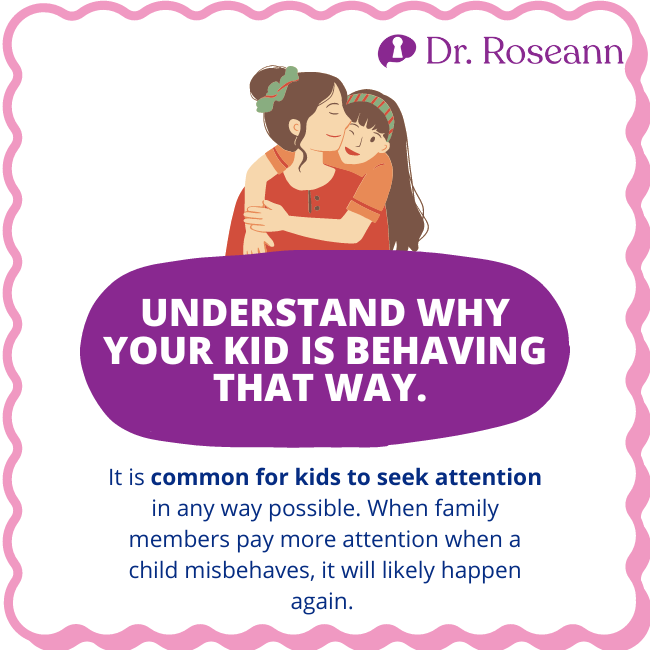
It is common for kids to seek attention in any way possible. When family members pay more attention when a child misbehaves, it will likely happen again. Even though we often think they do things on purpose, we should never assume that. For most kids, their brain and behavior just get stuck.
So why do kids act the way they do over and over? Despite how it seems, these behaviors aren't done on purpose but rather their subconscious brain forms a habit. We all develop habits due to associations formed in our brains. The more an association between a behavior and response happens, the more likely it is likely to be repeated.
Children's responses are more likely to form due to the simple fact that they do not know any other way to respond, so they repeat what they know. For example, if we tell a child not to do this or that, they don't know what they should be doing so they just repeat the familiar, albeit “wrong” behavior.
It is much easier for parents to avoid taking things personally once they understand that their children's behavior is related to how their brains respond to stimuli. The good news is that any behavioral pattern that has been learned can be unlearned with a shift in how you parent.
Rather than feeling frustrated over your child's behavior, consider what could be improved. The first step is to look at their behavior from a different perspective. A child misbehaves or has behavioral issues because they don't know what else to do. The best way to teach your child is to show them what to do.
Put some thought into what they need to demonstrate the good behavior you all want to see. Have they been unable to cope with the task and understand it? Are they still learning? You may be surprised by what you'll discover when you closely examine the cause of your child's behavior.
Parents can uncover a lot about their child's behavior if they take the time to look deeper. Although this is not a substitute for professional one-on-one support that you may need when your child's behavior feels out of control, it is helpful for parents to do this. The next step is to follow a positive reinforcement program and provide explicit guidance to enhance desired behaviors and learning further.
#2 Monitor your child's overall health.
Taking care of your child's health, including eating right, sleeping well, and exercising regularly, will help one cope with everyday life stresses and challenges. Parents need to assess their children's current habits and make any necessary changes.
Looking at their diet and sleep is where every parent should start. Think about if they are getting enough sleep or if they appear tired all the time and find ways to improve their sleep schedule. Diet is also very important because what you eat impacts the brain and behavior. Consistent protein helps to balance blood sugar and curb behavior.
You should see some positive changes if you commit your kids to a new schedule for a month. Consistency is important in order for changes in the brain to impact behavior.
#3 Reinforce positive behaviors.
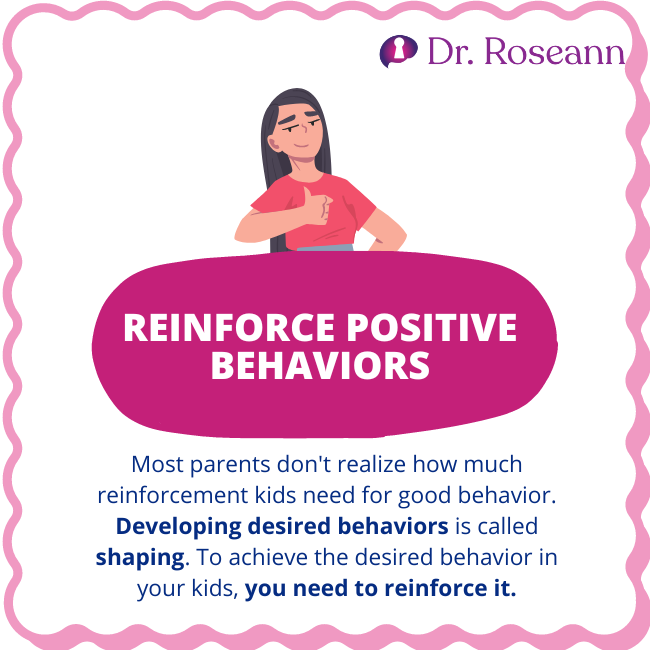
Most parents don't realize how much reinforcement kids need for good behavior. Developing desired behaviors is called shaping. To achieve the desired behavior in your kids, you need to reinforce it. Reinforcement should be very explicit.
Decide on one behavior you would like to reinforce and do so for at least 30 days. Then, recognize all steps your child has taken in the right direction. It is unnecessary to address all kinds of behavior, especially if you are not at risk of harming yourself or others. Keeping a behavior in check can be as simple as ignoring it. But unlike certain behaviors, negative emotions shouldn't be overlooked.
When highly upset, some children are too dysregulated to be left alone. Hence, it would be better for you to hold them or let them have downtime first and talk later. Then, after your child has calmed down, let them discuss their feelings and explore ways to cope and problem-solve.
#4 Manage your child's stress.
Stress can overwhelm emotionally dysregulated children, which can make coping more difficult for them. For example, if a child cries when they lose a game of cards, it may mean they can't manage. Their emotions overwhelms them, resulting in their inability to manage how they feel.
The lack of coping skills affects kids and children alike and they can be learned. Kids must develop problem-solving behaviors to build coping skills. Moreover, learning self-calming skills will help them now and in the future, so family regulation activities such as breathing exercises, yoga, art, etc. can help pave the way.
#5 Support your child during meltdowns.
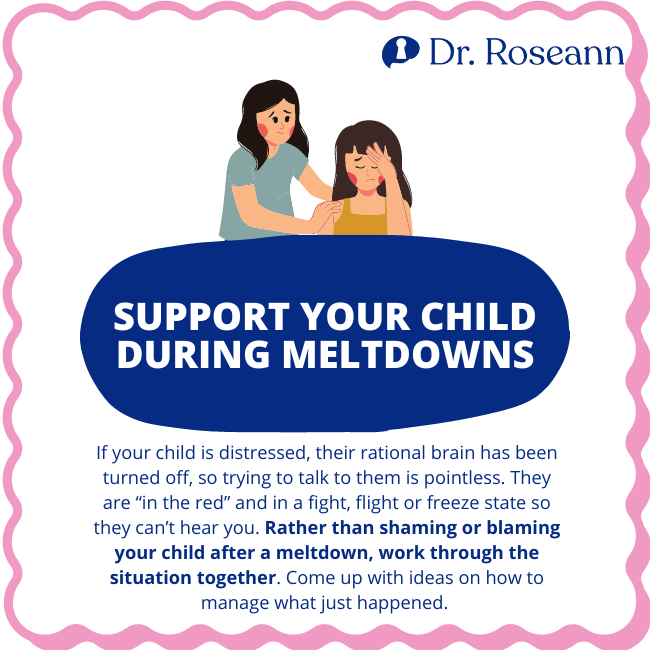
If your child is distressed, their rational brain has been turned off, so trying to talk to them is pointless. They are “in the red” and in a fight, flight or freeze state so they can't hear you. Rather than shaming or blaming your child after a meltdown, work through the situation together. Come up with ideas on how to manage what just happened.
Encourage them to think about what else they could have done. If they can't think of a solution, help them come up with two. Continually repeat this process until this skill becomes second nature to them.
#6 Provide social support.
Emotional resilience requires strong social interactions. Parents can teach their children how to build social relationships carefully. Help them identify people who can provide encouragement and support and keep them away from those who cannot.
School-age children and teens require social support. Young adults should be allowed to see their friends in a safe environment. Young children, on the other hand, rely on their parents for social support.
And explicitly teach how to have back and forth conversations. In a world full of highly stressed people, don't forget to emphasize emotional empathy.
#7 Communicate positively.
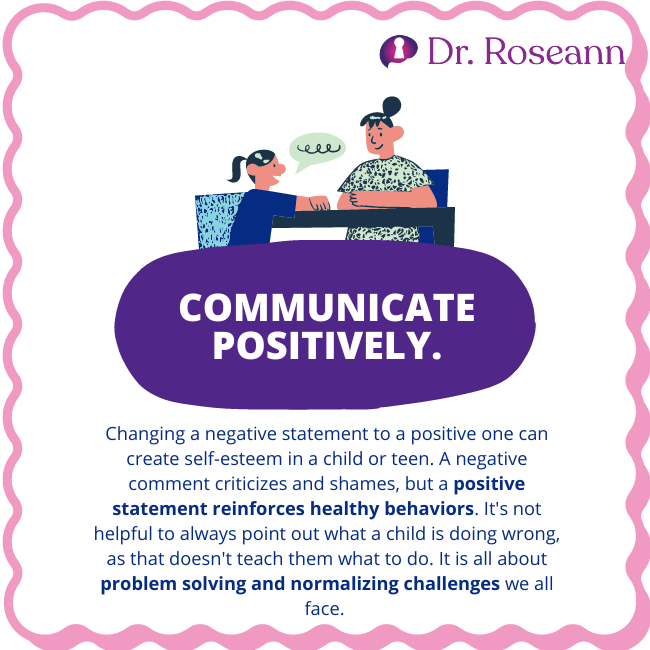
Changing a negative statement to a positive one can create self-esteem in a child or teen. A negative comment criticizes and shames, but a positive statement reinforces healthy behaviors. It's not helpful to always point out what a child is doing wrong, as that doesn't teach them what to do. It is all about problem solving and normalizing challenges we all face.
Rather than punishing, discipline should be centered on teaching. Using discipline that focuses on natural consequences will help your child learn healthy behavior. Having clear-cut rules and discussing expectations as a family is essential, so kids understand the boundaries.
#8 Empower them.
Teenagers and children need the power to make choices when situations are out of control. A sense of choice reduces the anxiety brought about by stressful situations. Get them started by creating a list of things they must do to earn everyday privileges.
In everyday life, always try to include them in decision making. From choosing how to spice the chicken to what time they are taking a shower, these little choices can make a big difference in their self-confidence.
#9 Set limits.
Clinical issues can have a big impact on everyday life for a child and their family. Post-traumatic stress disorder, attention deficit hyperactivity disorder, and anxiety can cause children and teens to display certain behaviors. Because of this, it is essential to set limits, so kids have explicit understanding of the implicit.
Be clear about your expectations while keeping a flexible attitude to accommodate your child's emotional state and behavioral needs. Disciplining children and teens requires clear boundaries, emotion-centered language, and a sense of family community.
#10 Use cognitive reappraisal strategy.
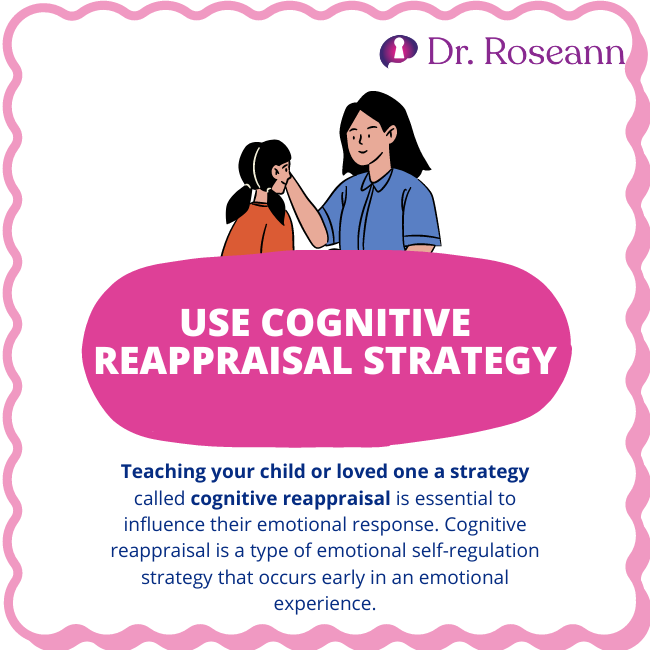
Teaching your child or loved one a strategy called cognitive reappraisal is essential to influence their emotional response. Cognitive reappraisal is a type of emotional self-regulation strategy that occurs early in an emotional experience. The objective of this strategy is to modify cognitive processes and reinterpret emotional events to change emotional experiences (Gross, 1998a).
Unwanted or uncomfortable thoughts can be managed by thought examination and reframing. In addition, this strategy helps identify processes that limit responsiveness to challenges, such as black-and-white thinking, overgeneralizations, and catastrophizing.
In cognitive reappraisal, stimuli are processed at a deeper level, thus enhancing memory. The benefits of this strategy include effective regulation of strong emotions and improved memory of emotional experiences (Wang et al., 2017).
Teach your kids good emotional regulation skills and coping strategies for their own well-being. Your child's behavior can be improved in different ways but it all starts with how they perceive, manage and recover from stress. That is how resilience is built. Resilience has a lot of lifelong benefits to a child's neurological and physical health.
Using neurofeedback, PEMF, and nutritional supplements may also be helpful. These natural solutions can relieve sensory needs and improve brain function. Using them makes it likely for your child to have a calmer brain, regulated behavior, and improved mental health.
Citations
Gross J. J. (1998). Antecedent & response-focused emotion regulation: divergent consequences for experience, expression, and physiology. J. Pers. Soc. Psychol. 74 224–237. https://doi.org/10.1037/0022-3514.74.1.224
Wang, Y. M., Chen, J., & Han, B. Y. (2017). The Effects of Cognitive Reappraisal & Expressive Suppression on Memory of Emotional Pictures. Frontiers in Psychology, 8. https://doi.org/10.3389/fpsyg.2017.01921
Always remember… “Calm Brain, Happy Family™”
Are you looking for SOLUTIONS for your struggling child or teen?
Dr. Roseann and her team are all about solutions, so you are in the right place!
There are 3 ways to work with Dr. Roseann:
You can get her books for parents and professionals, including: It’s Gonna Be OK™: Proven Ways to Improve Your Child’s Mental Health, Teletherapy Toolkit™ and Brain Under Attack: A Resource For Parents and Caregivers of Children With PANS, PANDAS, and Autoimmune Encephalopathy.
If you are a business or organization that needs proactive guidance to support employee mental health or an organization looking for a brand representative, check out Dr. Roseann’s media page and professional speaking page to see how we can work together.
Dr. Roseann is a Children’s Mental Health Expert and Licensed Therapist who has been featured in/on hundreds of media outlets including The Mel Robbins Show, CBS, NBC, PIX11 NYC, Today, FORBES, CNN, The New York Times, The Washington Post, Business Insider, Women’s Day, Healthline, CNET, Parade Magazine and PARENTS. FORBES called her, “A thought leader in children’s mental health.”

She coined the terms, “Re-entry panic syndrome” and “eco-anxiety” and is a frequent contributor to media on mental health.
Dr. Roseann Capanna-Hodge has three decades of experience in working with children, teens and their families with attention-deficit hyperactivity disorder (ADHD), autism, concussion, dyslexia and learning disability, anxiety, Obsessive Compulsive Disorder (OCD), depression and mood disorder, Lyme Disease, and PANS/PANDAS using science-backed natural mental health solutions such as supplements, magnesium, nutrition, QEEG Brain maps, neurofeedback, PEMF, psychotherapy and other non-medication approaches.
She is the author of three bestselling books, It’s Gonna Be OK!: Proven Ways to Improve Your Child's Mental Health, The Teletherapy Toolkit, and Brain Under Attack. Dr. Roseann is known for offering a message of hope through science-endorsed methods that promote a calm brain.
Her trademarked BrainBehaviorResetⓇ Program and It’s Gonna be OK!Ⓡ Podcast has been a cornerstone for thousands of parents facing mental health, behavioral or neurodevelopmental challenges.
She is the founder and director of The Global Institute of Children’s Mental Health, Neurotastic™Brain Formulas and Dr. Roseann Capanna-Hodge, LLC. Dr. Roseann is a Board Certified Neurofeedback (BCN) Practitioner, a Board Member of the Northeast Region Biofeedback Society (NRBS), Certified Integrative Mental Health Professional (CIMHP) and an Amen Clinic Certified Brain Health Coach. She is also a member of The International Lyme Disease and Associated Disease Society (ILADS), The American Psychological Association (APA), Anxiety and Depression Association of America (ADAA) National Association of School Psychologists (NASP), International OCD Foundation (IOCDF).
© Roseann-Capanna-Hodge, LLC 2023
Disclaimer: This article is not intended to give health advice and it is recommended to consult with a physician before beginning any new wellness regime. *The effectiveness of diagnosis and treatment vary by patient and condition. Dr. Roseann Capanna-Hodge, LLC does not guarantee certain results.

